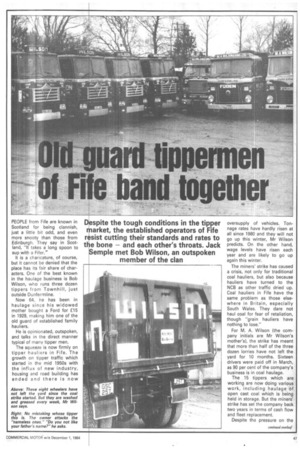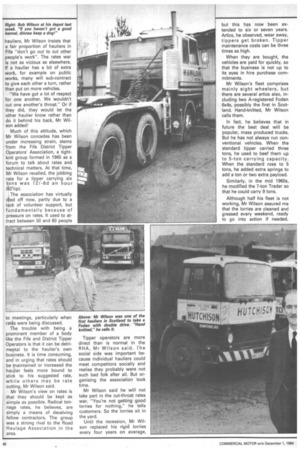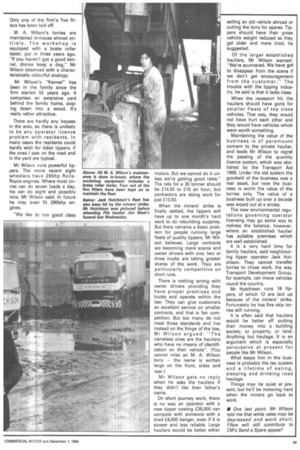PEOPLE from Fife are known in Scotland for being clannish,
Page 49

Page 50

Page 51

If you've noticed an error in this article please click here to report it so we can fix it.
just a little bit odd, and even more snooty than those from Edinburgh. They say in Scotland, "It takes a long spoon to sup with a Fifer."
It is a charicature, of course, but it cannot be denied that the place has its fair share of characters. One of the best known in the haulage business is Bob Wilson, who runs three dozen tippers from Townhill, just outside Dunfermline. • Now 64, he has been in haulage since his widowed mother bought a Ford for £15 in 1929, making him one of the old guard of established family hauliers.
He is opinionated, outspoken, and talks in the direct manner typical of many tipper men.
The squeeze is now firmly on tipper hauliers in Fife. The growth on tipper traffic which started in the mid 1950s with the influx of new industry, housing and road building has ended and there is now oversupply of vehicles. Tonnage rates have hardly risen at all since 1980 and they will not go up this winter, Mr Wilson predicts. On the other hand, wage levels have risen each year and are likely to go up again this winter.
The miners' strike has caused a crisis, not only for traditional coal hauliers, but also because hauliers have turned to the NCB as other traffic dried up. Coal hauliers in Fife have the same problem as those elsewhere in Britain, especially South Wales. They dare not haul coal for fear of retaliation, though "grain hauliers have nothing to lose."
For M. A. Wilson (the company initials are Mr Wilson's mother's), the strike has meant that more than half of the three dozen lorries have not left the yard for 10 months. Sixteen drivers were paid off in March, as 90 per cent of the company's business is in coal haulage.
The 15 tippers which are working are now doing .various work, including haulage of open cast coal which is being held in storage. But the miners'. strike has set the company back two years in terms of cash flow and fleet replacement.
Despite the pressure on the hauliers, Mr Wilson insists that a fair proportion of hauliers in Fife "don't go out to cut other people's work". The rates war is not as vicious as elsewhere. If a haulier has a bit of extra work, for example on public works, many will sub-contract to give each other a turn, rather than put on more vehicles.
"We have got a lot of respect for one another. We wouldn't cut one another's throat." Or if they did, they would let the other haulier know rather than do it behind his back, Mr Wilson added!
Much of this attitude, which Mr Wilson concedes has been under increasing strain, stems from the Fife District Tipper Operators' Association, a tightknit group formed in 1965 as a forum to talk about rates and technical matters. At that time, Mr Wilson recalled, the jobbing rate for a tipper carrying six tons was 12/-6d an hour (621/2p).
; The association has virtually ched off now, partly due to a lack of volunteer support, but fundamentally because of pressure on rates. It used to attract between 50 and 60 people to meetings, particularly when rats were being discussed.
The trouble with being a prominent member of a body like the Fife and District Tipper Operators is that it can be detrimental to the haulier's own business. It is time consuming, and in urging that rates should be rraintained or increased the haulier feels more bound to stick to his suggested rate, while others may be rate cutting, Mr Wilson said.
Mr Wilson's view on rates is that they should be kept as simple as possible. Radical tonnage rates, he believes, are simply a means of deceiving fellow contractors. The group was a strong rival to the Road Haulage Association in the area. Tipper operators are more direct than is normal in the RHA, Mr Wilson said. The social side was important because individual hauliers could meet competitors socially and realise they probably were not such bad folk after all. But organising the association took time.
Mr Wilson said he will not take part in the cut-throat rates war. "You're not getting good lorries for nothing," he tells customers. So the lorries sit in the yard.
Until the recession, .Mr Wilson replaced his rigid lorries every four years on average, but this has now been extended to six or seven years. Artics, he observed, wear away, tippers get broken. Tipper maintenance costs can be three times as high.
When they are bought, the vehicles are paid for quickly, so that the business is not up to its eyes in hire purchase cornmitments.
Mr Wilson's fleet comprises mainly eight wheelers, but there are several artics also, including two A-registered Foden 6x4s, possibly the first in Scotland. Hand-knitted, Mr Wilson calls them.
In fact, he believes that in future the best deal will be popular, mass produced trucks. But he has not always run conventional vehicles. When the standard tipper carried three tons, he used to beef them up to 5-ton carrying capacity. When the standard rose to 5 tons, he added extra springs to add a ton or two extra payload.
Similarly, in the mid 1960s, he modified the 7-ton Trader so that he could carry 9 tons, Although half his fleet is not working, Mr Wilson assured me that the lorries are cleaned and greased every weekend, ready to go into action if needed. Only one of the firm's five fitters has been laid off.
M. A. Wilson's lorries are maintained in-house almost entirely. The workshop is equipped with a brake roller tester, put in three years ago. "If you haven't got a good kennel, dinnae keep a dog," Mr Wilson observed with a characteristically colourful analogy.
Mr Wilson's "Kennel" has been in the family since the firm started 55 years ago. It comprises an extensive yard behind the family home, sloping down into a wood. It's really rather attractive.
There are hardly any houses in the area, so there is unlikely to be any operator licence problem with residents. In many cases the residents could hardly wish for tidier tippers, if the ones I saw on the road and in the yard are typical.
Mr Wilson runs powerful tippers. The more recent eight wheelers have 265hp RollsRoyce engines. Where most lorries can do seven loads a day, his can do eight and possibly nine, Mr Wilson said. In future he may even fit 290bhp engines.
"We like to run good class motors. But we cannot do it unless we're getting good rates." The rate for a 30 tonner should be E14.50 to £15 an hour, but contractors are doing work for just £13.50.
When the miners' strike is finally settled, the tippers will have up to one month's hard work to do rebuilding supplies. But there remains a basic problem for people running large fleets of quality tippers, Mr Wilson believes. Large contracts are becoming more scarce and owner drivers with one, two or three trucks are taking greater shares of the work. They are particularly competitive on short runs.
There is nothing wrong with owner drivers providing they have proper premises and trucks and operate within the law, They can give customers an excellent service on smaller contracts, and that is fair competition. But too many do not meet those standards and live instead on the fringe of the law, Mr Wilson argued: "The nameless ones are the hauliers who have no means of identification on their vehicle". (You cannot miss an M. A. Wilson lorry — the name is written large on the front, sides and rear.) Mr Wilson gets no reply when he asks the hauliers if they didn't like their father's name.
On short journey work, there is no way an operator with a new tipper costing 06,000 can compete with someone with a tired £4,000 banger, even if it is slower and less reliable. Large hauliers would be better either selling an old vehicle abroad or cutting the lorry for spares. Tippers should have their gross vehicle weight reduced as they get older and more tired, he suggested.
Of the larger established hauliers, Mr Wilson warned: "We're scunnered. We have got to disappear from the scene if we don't get encouragement from the customer." The trouble with the tipping industry, he said is that it lacks class.
When the recession hit, the hauliers should have gone for smaller fleets of top class vehicles. That way, they would not have hurt each other and they would have vehicles which were worth something.
Maintaining the value of the business is of paramount concern to the private haulier, and leads Mr Wilson to regret the passing of the quantity licence system, which was abo lished by the Transport Act 1968. Under the old system the goodwill of the business was a real asset, but now the business is worth the value of the lorries only. The value of a business built up over a decade was wiped out at a stroke.
The new environmental regulations governing operator licensing may go some way to redress the balance, however, where an established haulier has suitable premises which are well established.
It is a very hard time for family hauliers, said neighbour ing tipper operator Jack Hut chison. They cannot transfer lorries to chase work, the way Transport Development Group, for example, can move vehicles round the country.
Mr Hutchison runs 18 tippers, of which 12 are laid up
because of the miners' strike, Fortunately he has five skip lorries still running.
It is often said that hauliers would be better off putting their money into a building society, or property, or land. Anything but haulage. It is an argument which is especially persuasive at present for people like Mr Wilson.
What keeps him in the business is probably the tax system and a lifetime of eating, sleeping and drinking road haulage.
Things may be quiet at present, but he'll be motoring hard when the miners go back to work.
• One last point. Mr Wilson told me that while rates may be depressed and work short, Fifers will still contribute to CM's Send a Spare appeal!




























































































